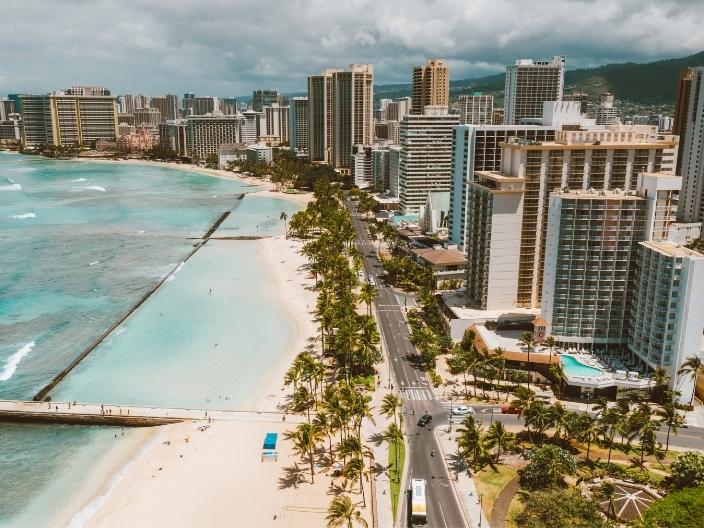Are you investigating how to get an HVAC license in Hawaii? Prospective contractors should be careful to pass the required tests, obtain the necessary additional licenses to work with plumbing and electrical systems, and purchase liability insurance or a surety bond before signing any contracts. Completing every step in this process is crucial for maintaining a legal, safe HVAC business.
Who Needs an HVAC License?
Contractors in Hawaii who wish to obtain contracts over $1,000 to work on heating, cooling, and general air systems must receive HVAC licensure as mandated by state law. They must receive this license through Hawaii’s Department of Commerce and Consumer Affairs, or the DCCA department.
HVAC License Types in Hawaii
HVAC contractors in Hawaii are typically referred to as “contractors.” These contractors may have a basic license along with many other licenses to designate their specialties of work. A basic HVAC license in Hawaii is the C-52 Ventilating and Air Conditioning contractor license — but this may not be all you need to complete jobs in the state. Because contractors frequently have to work with water, electricity, refrigeration, and sheet metal, you may also wish to obtain additional licensure to work in these areas as well:
- C-4 is hot water
- C-13 is steam fitting
- C-15 is electricity
- C-40 is refrigeration
Hawaii HVAC License Requirements
Contractors in Hawaii who work on HVAC units must pass an exam, register their business with the state, and hold different types of insurance depending on the jobs they wish to take. Learn more about HVAC license requirements in Hawaii.
Insurance Requirements
HVAC contractors in Hawaii need to purchase $100,000 in liability insurance, $300,000 per occurrence, and $50,000 in property damage insurance along with a surety bond. You additionally must remember to register your business with the state.
Use the tool below to request a free commercial insurance quote from our partners.
Hawaii HVAC Licensing and Registration Fees
You need a 70% score to pass this exam, which typically has 80 multiple-choice questions. Your fee for the exam will be $120. Contact your local board for more information on licensing fees.
Hawaii License Education Requirements and Exam
Getting an HVAC license in Hawaii can be an extensive process requiring tests, certifications, and high-quality training opportunities. As of now, you do not need a background check to sit for the HVAC contractor exam.
HVAC License Exam Details
If you wish to be a contractor, you need to pass an exam and potentially an EPA certification if you wish to work in certain conditions. You should have at least four years of experience in a supervisory environment to obtain a contractor’s license in this state and you should have received training in your area of work.
HVAC Training Schools in Hawaii
If you wish to stay in the state of Hawaii for HVAC training, you may wish to attend a trade school such as Honolulu Community College (contact at (808) 934-2710) to receive a top-notch education in HVAC technology. Other local schools include:
- HVAC Career Training (Career Now), (866) 893-0703
- Hvacredu.net (Online training), (888) 655-4822
- Kaua’i Community College, (808) 245-8311
Great HVAC training can be found both in-person and online. Use our tool below to find additional programs near you.
Hawaii License Application
If you meet the above requirements for scheduling your HVAC exam and you think you are mentally ready for the test, schedule your exam with the Department of Commerce and Consumer Affairs today. This is the first step to running a legal contractor business in this state and one you do not want to skip.
Registration and Permitting Requirements
Each state has its own regulations for license renewal as well as registration. For example, in Hawaii, you must hold a separate license if you wish to work with electricity or sheet metal. To use your contractor’s license legally, carefully consider the below information.
HVAC Registered Contractor Requirements in Hawaii
In Hawaii, you must be registered as a contractor in addition to having specific HVAC training from an education program such as a local trade school. Renewing your license every year is important to stay in good standing with your local government.
EPA Certification in Hawaii
If you wish to work with refrigerants, you need to hold an Environmental Protection Agency certification. Make sure you understand whether you need a Type I, II, or III EPA certification depending on the size and type of appliances you plan to work with.
HVAC License Hawaii FAQs
Are you still wondering about Hawaii HVAC license requirements or HVAC training in Hawaii? Consider the following frequently asked questions as you begin your journey to certification.
How Long Is My Hawaii HVAC License Valid?
Your license is valid for one year, and you will need to renew on September 30th of each year. Your EPA certification does not expire. Make sure your licenses, regardless of whether they are for HVAC, electricity, or refrigeration, are up to date before accepting new jobs.
Can I Use My Hawaii HVAC License in The Other States?
No. Hawaii does not have reciprocity agreements with other states.
Who Can I Contact If I Have Questions?
You may contact your local licensing department, your trade school, or other contractors you know if you have questions about receiving an HVAC license in Hawaii.
Understanding how to follow the steps above is important for legally securing your HVAC license. Learn more at the General Contractors License guide today and get in touch with your questions.
For More License and Career Guides
To find out how to become an HVAC-R technician in another state, start here.
For information on other trades in Hawaii, click on a link below to learn more about the licensing requirements:

